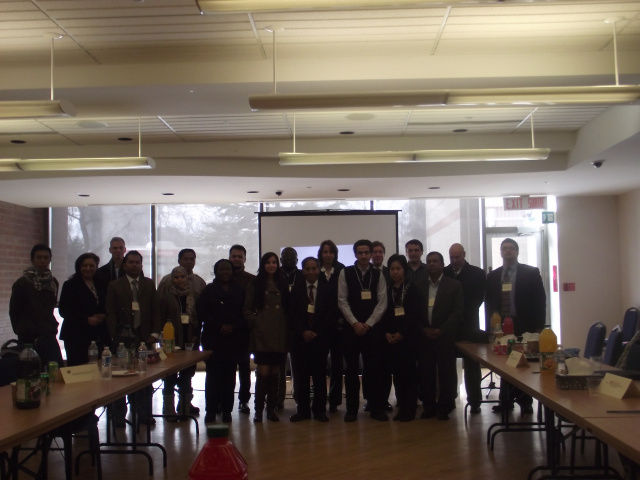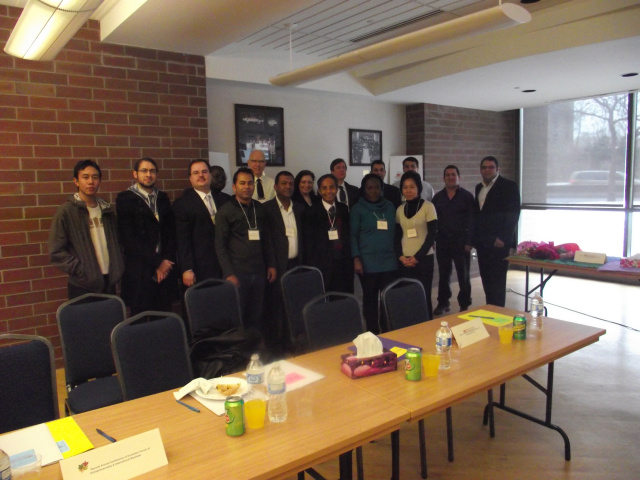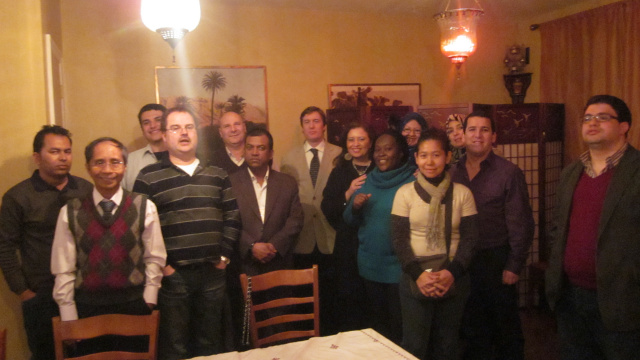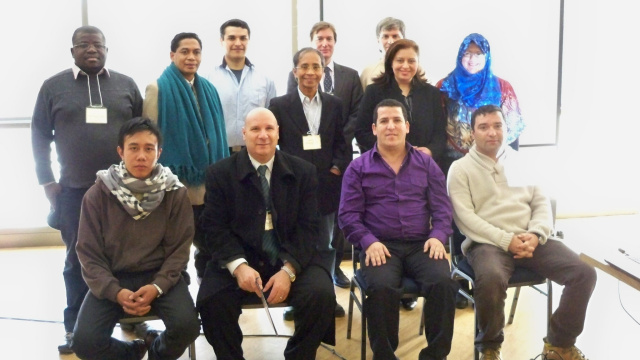ACEFEIB 

The Second Annual Conference of Economic Forum of Entrepreneurship & International Business

ECO-ENA: Economics & ECO-Engineering Associate, Inc., Canada
Conference Organizer: Ghada Mohamed
Conference Chairs: Ghada Mohamed, PhD., Morrison H. Schachler, Ph.D.
research_forum@eco-ena.ca
Conference Venue: University of Ottawa
90 University Building (The Residence Building), University of Ottawa)
Ottawa, Ontario, Canada
February 2nd, 3rd, and 4th, 2012
Dear conference delegates:
Thank you for making the conference successful :)

In the First Day Meeting
Click Here for more photos

In the Second Day Meeting
The Second Annual Conference of Economic Forum of Entrepreneurship & International Business:
ISSN 1925-4601 = The Annual Conference of Economic Forum of Entrepreneurship & International Business (CD-ROM): Library & Archive Canada
ISSN 1925-461X = The Annual Conference of Economic Forum of Entrepreneurship & International Business (Online): Library & Archive Canada
ISBN: 978-0-9810451-9-1 = The Second Annual Conference of Economic Forum of Entrepreneurship & International Business (Online): Library & Archive Canada
ISBN: 978-0-9810451-4-6 = The Second Annual Conference of Economic Forum of Entrepreneurship & International Business (CD-ROM): Library & Archive Canada
Only complete papers are accepted. All accepted papers are published in the above conference proceedings.
Top successful papers will be considered for publications in ECO-ENA, Inc., scientific journals in Economics & Business.
E-publications will be deposited into Library & Archive Canada.
Publisher: ECO-ENA: Economics & ECO-Engineering Associate, Inc., Canada
Conference Organizer: 
Ghada Gomaa A. Mohamed
ECO-ENA: Economics & ECO-Engineering Associate, Inc., Ottawa, Ontario, Canada
gmohamed@eco-ena.com
Conference Chair: 
Morrison Handley-Schachler
Principal Lecturer, School of Business, Teesside University
Middlesbrough, United Kingdom
Editor-in-Chief; the Journal of International Business & Economic Affairs; JIBEA, Canadian Edition
m.handley-schachler@tees.ac.uk
Conference Administrators:
Radamis Zaki; University of Ottawa
Ahmed Mahmoud, University of Ottawa
Amira Mohamed, University of Ottawa
Ammar Mounir, Carleton University
Special thanks to Trend Micro, Canada for their valuable gifts to the conference delegates.
Special thanks to the University of Ottawa, Ottawa, Ontario, Canada

In the Gala Gathering

In the Third Day Meeting - Financial Economics Meeting
Click Here for The Conference Proceeding
Presentations
Feb. 2nd, 2012
Research Commercialization, Households Behaviour & Jobs
Satisfaction, Piracy, Products, Marketing & Industry
© Second Annual conference of Economic forum of Entrepreneurship & International Business Participants: (By orders of presentations)
Rai Imtiaz Hussein, University of Education, Lahore, Pakistan rai_imtiaz_hussain@ue.edu.pk
Wenjhan Jane, Shin Hsin University, Taiwan wjjane@cc.shu.edu.tw
Ernesto Chacon Medina, Instituto Tecnologico y de Estudios Superiores de Monterrey, Campus Estado de Mexico, EGADE, Mexico
netox@lycos.com
Mehdi Zahaf & Leila Hamzaoui, Telfer School of management, University of Ottawa, Canada
zahaf@telfer.uottawa.ca, hamzaoui@telfer.uottawa.ca
Brian O’Higgins, Brian O'Higgins and Associates, Canada brian.ohiggins@rogers.com
Andrew Waitman, CEO, Pythian, Canada waitman@pythian.com
Jamal Hejazi, Gowlings, Canada jamal.hejazi@gowlings.com
Ghada Gomaa A. Mohamed; King Abdulaziz University, Jeddah, Saudi Arabia ghadagomaa1@yahoo.ca
Paper # (02-01) – Included in the conference proceedings
“Job Satisfaction and Intension to leave among University Teachers of Pakistan” Author: Rai Imtiaz Hussein
Abstract: This study aimed at exploring the relationship between employee’s job satisfaction and turnover intensions. The study was conducted on sample of 100 respondents taken from the different campuses of University of Education, Lahore. Different measures of employee job satisfaction were studies for this purpose like satisfaction with supervisor, satisfaction with job variety, satisfaction with compensation, satisfaction with co-workers and satisfaction with HR management policies. For analyzing; the relationship descriptive statistics and correlation were used. Furthermore, regression analysis was conducted to determine that whether any relationship between satisfaction and intend to leave exists or not. Results of the study showed that most of the respondents were satisfied with their job and negative relationships exist between satisfactions and intend to leave.
Keywords: Job satisfaction, Intention to leave, Satisfaction with supervisor, satisfaction with job variety, satisfaction with closure, satisfaction with compensation, regression analysis, Correlation.
Paper # (02-02) – Included in the conference proceedings
“Free Music (or Almost): A Profitable Business Model Author: Ernesto Chacon Medina”
Abstract: A business model about free legal distribution or at a very low price is economically profitable. To achieve this, the musical industry has to adopt itself to the new reality that the world, as well as the most recent information technologies is facing piracy is one of the resources collection methods that result more profitable for criminal groups and form its proliferation, as well as with the massive access to previously mentioned technologies, the legal recording sales fell at world-wide level. This work displays a sustainable model in behalf, mainly of musical creators.
Keywords: Music, Free Business Model, Low Price, Legal Piracy
Paper # (02-03) – Not included in the conference proceedings
“Are You Browsing More when others are Browsing? An Exploration of the Network Effects on Internet Usage”
Author: Wenjhan Jane & Yi-hsuan Chiang
Abstract: This article addresses the issues of network effects derived from network externalities for Chinese Internet usage. A sample of 65,441 individuals’ browsing behavior on the ten largest websites in Taiwan were collected and examined by using Poisson models. Results show that total hourly page views of a website are positively related to an individual’s hourly page views. An increase of 1,000 page views for a website will increase 2.2 individual’s page views. The evidence shows that a positive network effect exists. Gender, age, education, and income are also significant factors in the regressions. The results of the gender (/age) effect suggest that males (/young people) use these websites less than females (/older people). There exists a network externality on website usage that causes large websites to grow rapidly as smaller ones are driven out of the market. Therefore, regulation needs to focus on ensuring fair competition in the marketplace.
Keywords: Network effect; Gender effect; Internet usage
Paper # (02-04) – Included in the conference proceedings
“What Would Make Consumers Trust Organic Products? A Qualitative Study Based on the Distributors’ Perspective”
Authors: Leila Hamzaoui-Essoussi, Lucie Sirieix and Mehdi Zahaf
Abstract: Despite growing demand for organic food products, trust is missing at various levels of the marketing value delivery system. Hence, Canada, among other countries, needs to address important issues related to the level of trust/ mistrust in OF products. The purpose of this paper is to examine the dimensions and variations of trust among consumers as perceived by the distributors, and to determine the distribution channel strategies used to increase consumers’ trust in OF products. The study is based on data collected through individual in depth interviews with a lot of 60 respondents that are managers from superstores, specialty stores, farmers’ markets and producers. Based on the distributors’ perspectives, findings show that levels and dimensions of trust differ significantly depending on the distribution channel as consumers rely on different factors for building their trust in OF. This clearly affects strategies and tools used by distributors to enhance trust in OF and in the distribution channels.
Keywords: Consumers’ trust, Organic products, Distributors, perspective, qualitative Study.
Paper # (02-05) – Not included in the conference proceedings
“Decision Making & Consumers’ Behaviour: A Cognitive Game Approach”
Author: Ghada Gomaa A. Mohamed
Abstract: This paper utilizes a theoretical analysis of a cognitive game approach to address the relationship between decision makers in the government of USA & consumers’ behaviour as an assessment of the payoff during the financial global crisis started in USA in the last quarter of 2007. The research starts with a strong assumption that the American consumer was the first node of a chain contains many other related economic variables and the reaction of consumers’ behaviour toward a specific government policy can affect all other sectors in a spiral manner. A cognitive game is utilized in this paper to explain consumers’ behaviours toward the expansionary government policies the government decided to adopt at times of the crisis. The paper also assumes a neural risk taker agent.
Keywords: Government decision making, Consumers’ spending, Game theory analysis, the global financial crisis, USA
Panel # (02-001) – “Commercialization of University Research”
Speaker: Brian O’Higgins, Brian O'Higgins and Associates, Canada brian.ohiggins@rogers.com
Who’s He?
Brian O’Higgins, President, Brian O’Higgins and Associates
“Brian O’Higgins is an executive with over 20 years as a leader in security technology development for enterprise and government customers—possibly known best for his role pioneering PKI (public key infrastructure)— and as the co-founder and Chief Technology Officer of Entrust, a leading Internet Security Company. He was also a co-founder and Chief Technology Officer of Third Brigade, a provider of security products for physical and virtualized servers that was acquired by Trend Micro in 2009. Brian's approach to security is both visionary and pragmatic. He is a frequent presenter at security and industry events around the globe. In 2008, he was appointed as a delegate to contribute to the Global Cyber security Agenda of the International Telecommunications Union. He is also a founding author and contributor to the Cloud Security Alliance.
Brian’s current list of affiliations includes advisory board positions with Defence R&D Canada, the Ontario Centers of Excellence, the NSERC Internetworked Systems Security Project, the Global Institute for Cybersecurity Research Alliance, and a few startup companies in the IT security market. In addition, he serves on the boards of Recognia, Fischer International, AFORE, and Mobio Identity Systems.
Brian is an avid skier on both snow and water, and a competitive marathon runner.”
Panel # (02-002) – “Building Start-Up for Global Markets in Canada”
Speaker: Andrew Waitman, CEO, Pythian, Canada waitman@pythian.com
Who’s He?
“Prior to joining Pythian, for 12 years Andrew was the Managing Partner at Celtic House Venture Partners, a leading Canadian venture capital firm where he recruited the team, led the strategy, raised the funds and provided the most consistent investment track record: a Canadian best with more than a dozen successful M&A transactions, four IPOs and not one single bankruptcy in twenty five start-up investments during his Board of Directors oversight.
A sought-after thought leader and public speaker, Andrew has presented to such organizations as the Canadian Venture Capital Association and the Ottawa Centre for Research and Innovation. He has guest-lectured for MBA programs at Cornell University, Queen’s University, the Richard Ivey School of Business at the University of Western Ontario, and the University of Ottawa. He has also taught entire courses on venture capital at the Queen’s School of Business.
In addition to being a Professional Engineer and a Chartered Financial Analyst (CFA), Andrew’s other passions include writing about business insights, reading non-fiction books on any topic, playing racquet sports (tennis, squash, ping pong) and drinking wine – preferably French... red... and from Bordeaux.
Recommended Reading by Waitman
The Greatest Minds of All Time by William Durrant Fooled by Randomness by Nassim Taleb
Three Cups of Tea by Greg Morteson Complications by Atul Gawande
Your Inner Fish by Neil Shubin
Why Most Things Fail by Paul Ormerod Linked by Albert-Laszlo Barabasi Reinventing The Sacred by Stuart Kauffman Genome by Matt Ridley
The Ancestor’s Tale by Richard Dawkins”
Panel # (02-003) – “Has there been A Structural Break in the Pharmaceutical Industry from Transfer Pricing Perspective: A Look at North America”
Speaker: Jamal Hejazi, Gowlings, Canada
jamal.hejazi@gowlings.com
Who’s He?
Jamal Hejazi, Chief Economist
“Jamal Hejazi is a senior member of the Gowlings Transfer Pricing and Competent Authority team. Working in conjunction with the Firm's National Tax Practice Group, Jamal helps organizations optimize their global tax position and reduce exposure to unfavorable audit assessments through proper tax planning and implementation strategies. He has been involved in work for a number of industries including automotive, pharmaceutical, energy, computer software, gaming, manufacturing and services. He also specializes in intangible valuation and has done work for both the technology and biochemical sectors.
Prior to joining Gowlings, Jamal was a senior transfer pricing economist with the Canada Revenue Agency, where he participated in the resolution of a number of transfer pricing issues, including the relief of double taxation on Canadian corporations. He was instrumental in the negotiation of Advanced Pricing Agreements between Canada and foreign tax authorities.
Jamal has also held a faculty position at the University of Windsor, and was a lecturer at both Carleton University and the University of Phoenix. He has also served as an expert witness at the Tax Court of Canada.
Complementing his graduate degrees, Jamal has recently earned the Registered Professional Accountant (R.P.A.) designation. He is currently completing his CPA designation in the State of Illinois.”
Feb. 3rd , 2012
Entrepreneurship, Private Business, Corporate Governance, Labour
Conflicts, and International Investment
© Second Annual conference of Economic forum of Entrepreneurship & International Business Participants: (By orders of presentations)
Suppanunta Romprasert, Assumption University, Thailand thailandsuppanunta@yahoo.com
Mamunur Rashid, Curtin University, Perth, WA, Australia mamunur.rashid@postgrad.curtin.edu.au
Eduardo Roca, Griffith University, Brisbane, Queensland, Australia e.roca@griffith.edu.au
Frank Florinel Cotae, Mount Royal University, Calgary, Alberta, Canada fcotae@mtroyal.ca
Ali Muhammad, University of Liverpool, United Kingdom ali.muhammad@liv.ac.uk
Adey Al Mohsen; Carleton University, Canada aalmohse@connect.carleton.ca
Morrison Handley-Schachler, Teesside University, UK m.handley-schachler@tees.ac.uk
Cenap Cakmak, Eskisehir Osmangazi University, Turkey cenapcakmak@yahoo.com
Paper # (03-01) – Included in the conference proceedings
“Applied Econometrics for Agricultural Futures: Case of Natural Rubber Smoked Sheets No. 3”
Author: Suppanunta Romprasert
Abstract: This study investigates the efficiency of future pricing for ribbed smoked rubber sheet no. 3 (RSS3) during the period 2004 – 2009 and presents forecasting models along with results from the most efficient models that can help investors make more accurate buy and sell decisions. It addresses the question “Is price process in RSS3 futures market efficient?” Time series data from RSS3 futures was used as a leading indicator for the spot price of Thailand. The results indicate that the daily futures prices served as unbiased estimators of future spot prices and there was independence on daily price changes. The tests consistently supported the unbiased hypothesis which implies that Thailand’s RSS3 future market is efficient and aids the process of price. This study would fill the information gap in the prediction of future spot prices with a guide to understanding how the futures market behaves. Part of forecasting, the study employs univariate, market timing and Diebold-Mariano as the criterions for the selection of the best prediction model. It includes an analysis of factors affecting the RSS3 futures prices in Thailand’s futures market. The results show that the TOCOM, world synthetic rubber consumption, net imports natural (China) and crude oil price significantly affect the futures prices in the same direction. Particularly, the crude oil price is the leading indicator for the trend in rubber futures prices in Thailand. The analytical model is shown to be applicable and would facilitate related studies in forecasting the futures prices of other commodities. The time-series data is found to be suitable for the forecasting model.
Keywords: Futures pricing, Forecasting model, and Unbiased Estimators.
Paper # (03-02) – Included in the conference proceedings
“How Does Undervaluation Affect Firms Going Private in Australia?” Authors: Mamunur Rashid & Subhrendu Rath
Abstract: This paper analyzes undervaluation as a determinant in going private transactions in Australia. We used a set of unique hand collected data within a period from 1990 to 2010 to develop and test a predictive choice model that distinguishes between firms went private from firms that did not go private. The analysis shows that firms taken over by PE firms suffer from market undervaluation, a possible effect due to information asymmetry existing between the market and managerial perception. This managerial perception is likely to act as an incentive for the managers to take their companies private. We also find liquidity as an important determinant in a going private decision. In addition, takeover speculation is found to be significant which means that market for corporate control plays its important role in Australia. The results are robust to the choice of alternative measures of undervaluation.
Keywords: Private equity, Going private, Takeovers, undervaluation, Australia
Paper # (03-03) – Not included in the conference proceedings
“Are Real Estate Markets Globally Integrated? Evidence From Case-wise Bootstrap Analysis”
Authors: Eduardo Roca & Abdulnasser Hatemi. J
Abstract: The paper investigates the extent by which real estate markets are integrated with the world market. The paper applies a case-wise bootstrap analysis – a method that is robust to non-normality and increased volatility that characterizes financial markets especially during periods of distress. It also takes into account the effect of the global financial crisis. The investigation is conducted in relation to the major real estate markets, namely, the US, UK, Japan and Australia. The paper found that all four markets are integrated with the world market. The US and the UK markets are the most internationally integrated while Australia is the least. The results also show that the US real estate market is more integrated internationally but resulted in the Japanese market becoming less globally integrated. In the cases of Australia and the UK, the crisis did not affect at all their level of integration with the world market.
Keywords: Beta, Casewise, Bootstrap, real Estate, World Stock Market
Paper # (03-04) – Included in the conference proceedings
“A Conceptual Framework Linking Entrepreneurs to International New Venture Competitiveness”
Author: Frank Florinel Cotae
Abstract: A long-standing view in the literature has been that international new ventures (INV) are affected by liabilities such as smallness, newness and foreignness. The need for born globals has been to identify a modality through which they can mitigate these costs. In focusing on finding a model that would define, identify and explain the factors affecting the link between entrepreneurs, networks, international new ventures and internationalization related liabilities we have decided that at the center of a dialogue we need to consider the individual as the cornerstone of such a link. One model that stands out - advanced by Phelan, Dalgic and Sethi (2006) – allows for just such an origination point for a dialogue as it is based upon an entrepreneur’s traits of social astuteness and competence that are expected to offer relief from the above referenced detriments. In this paper, we argue that Phelan et al model, while important as a contribution, is not sufficient in mitigating the globalization related liabilities. Through the medium of extant research and studies the model is analyzed as part of three fragments. First, the model is compared with findings from internationalization -reflecting economic condition as key-, embeddedness - the only one found to reflect some of the model’s conceptual framework- and tacit theories - reflecting entrepreneurial uniqueness in recognizing and pursuing opportunities key as for securing INVs competitive advantage. Second, external factors such as behaviour, legal environment and goal commitment are applied to INV competitiveness. The third segment points out to geographic differences, as further considerations that refute some of model’s claim, suggesting that INVs come to existence due to small domestic markets and strong immigrant communities, and place into the foreground the concepts of national attitudes and entrepreneurial maturity. The concluding fragment presents a modified theoretical framework for addressing the factors affecting INV success and competitiveness. The discussion part points out both the need to continuing the dialogue regarding INVs, networks and entrepreneurs in general and the lack of comprehensive nature of the concluding considerations. The article concludes that the implications for managers are two pronged: one related to increased awareness and understanding of the external factors affecting international market entry and second related to acquiring the ability to model INV according to general framework capable to mitigate cost related consideration. The recommendations for further research point to the need for both further identification of relevant external factors and statistical testing of the overall findings and propositions. The article’s strength lies in its pursuit of a conceptual framework and dialogue and the limitation is in that it does not substantiate the findings with relevant measurements.
Keywords: Entrepreneur, International new venture, Entrepreneurial networks, Social compétence.
Paper # (03-05) – Not Included in the conference proceedings
“Culture’s Consequences in Entrepreneurial Orientation: The Case of Afghan Migrants”
Authors: Ali Muhammad, Saeed Akbar & Murray Dalziel
Abstract: This study presents a qualitative profile of migrant entrepreneurs of the world’s highly orthodox and impoverished nations; the Afghans. It is well documented that in the developed world culture may persuade an entrepreneur to innovate new product, service or venture. However, the scenario is different in emerging economies where socio-cultural factors may facilitate people to pursue entrepreneurship as a mean to earn livelihood. This study therefore explores the effects of socio-historic cultural traits and customs upon the entrepreneurial orientations of the Afghan migrants in Pakistan. In order to support their family members, Afghan migrant entrepreneurs have invented peculiar ways of coping with harsh economic realities. In an atmosphere of civil wars, chaos and disadvantages, unemployment and lack of money provides extrinsic motivations to the Afghans migrants. They are labeled mostly as necessity entrepreneurs being pushed into self- employment due to factors such as wars, economic downturn and strong adherence to cultural traits. Our findings are in consistence with the interactive model of cultural theory and migrants’ disadvantage theory. Overall, this paper contributes to the literature by highlighting the role of interest socio-cultural traits in developing enduring entrepreneurial orientations.
Keywords: Entrepreneurship, Culture, Traits, Orientation, Afghan, Livelihood, Necessity, Self-employment, Afghan migrants, Entrepreneurial Characteristics.
Paper # (03-06) – Not included in the conference proceedings “Demobilization of labour unions in Egypt after the 2011 Uprising’” Author: Adey Al Mohsen
Abstract: The paper looks into the history of labor organization in Egypt, focusing on the late nineties and early two thousands wave of strikes and sit-ins by factory workers in al-Mansoura, al-Mahalla al-Kubra, and Suez. Workers protested privatization, neo-liberal reforms, and reduction of social benefits. The workers cause served as a launching pad for a number of social democratic and liberal parties (‘harakit kifaya, ‘harakit sitta abreil). These organizations accorded the socio- economic demands of the workers a political edge. This, among other things, resulted in a massive pro-democracy movement in the entire country, and which soon began to draw the support of many sectors of Egyptian society. Next, the paper examines how these organizations were engaged in events leading up to the 2011 Revolution and what role did workers and their unions play. With the rise of a new political bourgeoisie after Mubarak (composed mainly of the Muslim Brotherhood) and with the youth movements focus on liberal democratic reforms the workers movement was essentially demobilized. Strikes were officially banned by Sharaf's government and civil society organizations rejected the demands of the workers and labeled them to be denominational (fe'awiyya) claiming that workers’ demands are subsidiary to the needs of the revolution - let alone the Islamists alliance with the SCAF. Why was this case and why did the worker's movement lose much of its momentum in 2011 are some of the questions that this presentation will investigate.
Keywords: Labour demobilization, Labour Strikes, the Egyptian Revolution.
Panel Discussion # (03-001): “Corporate Governance - Who benefits?”
Chair: Morrison Handley-Schachler, Teesside University, UK m.handley-schachler@tees.ac.uk
Panel Discussion # (03-002): “Small Business & Entrepreneurial skills”
Chair: Frank Florinel Cotae, Mount Royal University, Calgary, Alberta, Canada fcotae@mtroyal.ca
Panel Discussion # (03-003): “International Political Relations & MNCs”
Chair: Cenap Cakmak, Eskisehir Osmangazi University, Turkey cenapcakmak@yahoo.com
Feb. 4th , 2012
Financial Economics, Micro-Finance, Economic Growth, and
International Trade
© CEHAES first International Conference of Financial Economics ---ECO-ENA, Inc., Financial Economics Annual Meeting —
Participants: (By orders of presentations)
Isabelle NKapnang Djossi, CARBAP (Centre Africain de Recherche Sur Bananiers et Plantain), Cameroun
nkapnang2001@yahoo.com
Ahmed Saddam Abdul Sahib, University of Malaya, Malaysia
ahmed_saddam@live.com
Eduardo Roca, Griffith University, Brisbane, Queensland, Australia
e.roca@griffith.edu.au
Cenap Cakmak, Eskisehir Osmangazi University, Turkey cenapcakmak@yahoo.com
Kamel Fantazy, University of Sharjah, UAE kafantazy@yahoo.com
Jamel Boukhatem, EconomiX University of Paris West Nanterre - la Defense – France & URMOFIB University of Tunis-El Manar – Tunisia jboukhatem@yahoo.com
Jamal Hejazi; Gowlings, Canada jamal.hejazi@gowlings.com
Ghada Gomaa A. Mohamed; King Abdulaziz University, Jeddah, Saudi Arabia ghadagomaa1@yahoo.ca
Morrison Handley-Schachler, Teesside University, UK m.handley-schachler@tees.ac.uk
Paper # (04-01) – Included in the conference proceedings
“The Determinant of Entrepreneurship Efficiency: The Case Study of Banana and Plantain Farm Cameroon”
Authors: Nkapnang Djossi Isabelle & F. Gaspart
Abstract: This article addresses entrepreneurship efficiency of banana and plantain producers in Cameroon using a translog production function of a sample of 161 producers from three regions with different agro-ecological and demographic factors (the South, the Southwest and Littoral) was estimated. The results show that the technical production factors such as the farm surface, the combined effect of the use of improved plants, and chemicals, all contribute positively to the production of plantain in Cameroon. However, investment factors such as transportation and watering of plants do not have a significant effect on production.
Furthermore, environmental characteristics of the farming area, such as high population density, have a negative effect on the technical efficiency of plantain production in Cameroon, a finding that may not be true in other plantain-growing areas. Socioeconomic characteristics of farmers, such as the ethnic group and the completion of primary and secondary education, improve the production of banana and plantain in Cameroon while the rising age of farmers has a negative effect on production.
Keywords: Efficiency, Plantain, Banana, Producer, Translog, Production Function
Paper # (04-02) – Included in the conference proceedings
“Foreign Trade, FDI, and Their Impact on Growth in GCC Countries: Evidence from Qualitative and Quantitative Approaches”
Author: Ahmed Saddam Abdul Sahib
Abstract: This paper aims to measure the impact of foreign trade and FDI in GCC economies. We found that the role of FDI is positive in UAE and negative in Saudi Arabia, while it has no effect on the rest of the GCC countries. In addition, the study confirms the continued importance of oil exports, except for Bahrain. Furthermore, the non-oil coefficient did not affect economic growth, and the commodity imports have a positive impact except for the UAE.
Keywords: Economic growth, foreign trade, FDI, GCC countries.
Paper # (04-03) – Not included in the conference proceedings
“The effect on Price, Liquidity, and Risk When Stocks are Added to and Deleted from a Sustainability Index: Evidence from Asia Pacific Context”
Authors: Eduardo Roca & Adrian Cheung
Abstract: the paper examines the impact on returns, risk and liquidity of stocks in the Asia Pacific markets when included into and deleted from the Dow Jones Sustainability Worlds Index over the period 2002 – 2010. Using an event study methodology, we test five existing hypotheses and two new ones, called the “sustainability redundancy hypothesis.” which we developed. Consistent with the “sustainability redundancy hypothesis”, the paper found that both index addition and index deletion stocks experience a significant decline in returns, an increase in trading volume, no change in systematic risk and an increase in idiosyncratic risk. This indicates that sustainability matters to Asia Pacific investors, although in a somewhat negative manner.
Keywords: Corporate sustainability, Index additions and deletions, Asia pacific, Event study
Paper # (04-04) – Included in the conference proceedings
“How Related are Politics and Trade? Impact of deterioration in Bilateral Political Ties upon Economic Relations between Turkey and Israel”
Authors: Cenap Cakmak & Murat Ustaoglu
Abstract: This paper investigates the relationship between trade and politics, particularly the effect of improved or deteriorated political ties upon economic relations with particular reference to the bilateral trade and diplomatic relations between Turkey and Israel. The study finds that economic relations were bolstered at times of enhanced political relations whereas visible deterioration or decline was observed in the volume and state of trade relations when diplomatic relations worsened. The findings are consistent with the main arguments in the literature that politics determines trade. The paper concludes that at some critical points where the two countries have experienced difficulties and a state of crisis in their political relations, the volume of bilateral trade has also significantly declined.
Keywords: Political risk, Foreign trade volume, Israel, Turkey Paper # (04-05) – Included in the conference proceedings
Intra-Regional Trade, Evidence from the Kingdom of Saudi Arabia (KSA): A Structural Equation Modeling (SEM) Approach
Authors: Souad Sherif & Kamel Fantazy
Abstract: The purpose of this paper is to examine the bilateral trade flows across three Gulf Cooperation Council countries—the Kingdom of Saudi Arabia (KSA), Bahrain (BAH), and Qatar (QAT)—over the last 30 years (1981-2010). The study focuses on the relationships between BAH and QAT, combined as one group, and KSA, which has a relatively larger economic mass and population. The empirical analysis consists of various economic factors, including gross domestic product (GDP), population growth (POP_GR), gross domestic product per capita (GDP/CA),
the distance between countries (DIST), and Kingdom of Saudi Arabia Export (KSA_EX). Data related to bilateral trade was collected from the International Monetary Fund (IMF). The proposed model was tested using the structural equation modeling technique. The results indicated that GDP, POP_GR, and GDP/CA have a positive relationship with the level of KSA_EX, while the DIST related negatively to the level of KSA_EX. This result showed an increase in trade cost as the distance between the two trading partners increased; countries that share a border have more trade with each other than countries that do not share a border.The study shows that all factors are crucial to the success of bilateral trade flow between both parties (BAH and QAT) and KSA because they provide the facts that decision makers need to make the appropriate decisions. Also discussed are the conclusions and the limitations of this study that could be addressed in future research.
Keywords: Bilateral trade; economic integration; structural equation modelling; GCC; regional integration
Paper # (04-06) – Included in the conference proceedings
“Financial development and poverty: econometric assessment of the
direct effect on a panel of lower and middle income countries”
Authors: Jamel BOUKHATEM & Bochra MOKRANI
Abstract: This paper empirically examines the existence of a direct effect of financial development on poverty reduction in 67 low and middle income countries over the period 1986-2009. The results obtained suggest that the financial development contributes directly to the reduction of poverty, and this, independently of the econometric method used. On the other hand, instability related to the financial development would penalize the poor population and would annihilate the positive effects of financial development. Thus, is it necessary to find a trade-off between the financial development and its instability in order to ensure a pro-poor growth? Does Islamic finance constitute, in this direction, a panacea?
Keywords: Financial development, Poverty, Instrumental variables
Islamic finance Paper # (04-07) – Not included in the conference proceedings
“Economic Growth Rates of the GCC: Absolute or Relative Convergences? Panel Data Analysis”
Authors: Ghada Gomaa A. Mohamed, Morrison Handley-Schachler, and Nisreen Al- Banawi
Abstract: This paper addresses both the absolute & the conditional convergence amongst the 6 GCC states; Saudi Arabia, UAE, Qatar, Bahrain, Kuwait, and Oman. The paper presents first a theoretical framework that illustrates the theoretical findings of the Solow-Swan growth model regarding both the absolute and the conditional convergences. Then the paper addresses intuitively all possibilities of convergence amongst the 6 GCC states and main economic differences amongst them. Then, the paper utilizes various stochastic convergence techniques to test the convergence hypothesis after controlling for various variables and parameters.
Keywords: Economic Growth Rates, Beta Convergence, Stochastic convergence, Panel Data Analysis
Panel Discussion # (04-001): “What is Transfer Pricing and why is it the most Important International Tax Issue of our Time?”
Chair: Jamal Hejazi; Gowlings, Canada
jamal.hejazi@gowlings.com
Panel Discussion # (04-002): Financial market - “What is a market price?”
Chair: Morrison Handley-Schachler, Teesside University, UK m.handley-schachler@tees.ac.uk
End of Conference
Click here for the Third Annual Conference of Economic Forum of Entrepreneurship & International Business; Oxford U., UK
Conference Organizer: Ghada Mohamed
Conference Chairs: Ghada Mohamed, PhD., Morrison H. Schachler, Ph.D.
research_forum@eco-ena.ca
All rights reserved
ECO-ENA: Economics & ECO-Engineering Associate, Inc., Canada